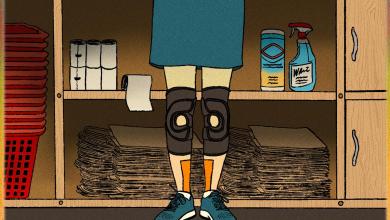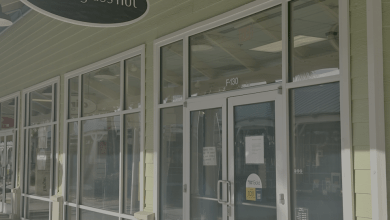Oklahoma wildfires destroy more than 200 homes; one dead; Gov. Stitt declares emergency
Almost 300 houses and structures were destroyed by the wildfires that burned across the state on Friday and sent some Oklahomans fleeing with only the clothes on their backs, Gov. Kevin Stitt said.
Communities in both rural and urban areas across the state were hit, many severely, including Stillwater and Mannford.
“It was just a perfect storm,” Stitt said Saturday morning, revealing his own farmhouse north of Luther had been lost.
The governor said at a news conference in Mannford that there was a fatality from a vehicle accident caused by smoke. He said about 170,000 acres in Oklahoma burned.
Stitt declared a “disaster emergency” for 12 counties, explaining at the news conference that it will help those affected get access to federal resources.
The counties are Oklahoma, Cleveland, Creek, Dewey, Grady, Lincoln, Logan, Pawnee, Payne, Pottawatomie, Roger Mills and Stephens.
The declaration also means a law preventing price gouging after disasters is now in effect for those counties. The law prohibits an increase of more than 10 percent for the price of goods and services, Attorney General Gentner Drummond said.
The wildfires came from a historic storm that is crossing the nation, spawning deadly tornadoes in Missouri. In Oklahoma, the storm on Friday brought 60 to 70 mph winds. The sustained gusts knocked down power lines, ripped off shingles from houses, broke tree limbs, felled street signs, caused road closures and filled the sky with dust.
The highest wind gust − 83 mph − was reported in Frederick, in far southwest Oklahoma, the National Weather Service said.
The number of reported fires was more than 130 in 44 counties, the Oklahoma Department of Emergency Management said Friday night.
The extreme conditions were unusual even in a state where the official state song begins with a line about the wind “sweepin’ down the plain.” Winds had calmed Saturday but the National Weather Service warned the fire risk was still elevated to near critical.
“I prayed all night,” said Rose Van Orden, 68, who fled barefoot from her home in Stillwater with her two dogs Friday afternoon.
She returned to her neighborhood at 7 a.m. Saturday after spending the night in her car. She said she found her front and back yards burned but her home spared. She said other homes in her neighborhood were gone.
“It was just so random,” she said. “It is still so hard to grasp how it could just kind of skip here and, boom, a couple of houses down it just engulfed it.”
Jeremy Cook also returned to his neighborhood in Stillwater at 7 a.m. Saturday. He found his home burned to the foundation.
He and his children had left for safety Friday, loading up three cars full of wedding photos, pets, personal books and family paintings.
“I toggle between laughing and crying because we had so much,” Cook said.
“I’d mowed my woods and I was cutting any dead tree. I mean, this was as prepared for a fire as you could get. You never know; this is Oklahoma,” Cook said. “But when that wind shifted, and that fire started coming, well my brick house burned down.”
Cook said he’s had college friends drop everything to help, strangers dropping off food and water, and fellow churchgoers bringing clothes.“It doesn’t get better than Oklahomans; It really doesn’t. They’re always there and there is nobody better than Okies,” Cook said.
A Norman fire victim, Nate Stephenson, said he has been contacted by more than 40 people offering help. “It’s good to be loved,” he said.
Nate Stephenson’s home in Norman was destroyed by a wildfire Friday.
Stephenson rushed home Friday and was only able to grab a few items and his pets before flames destroyed it. He said he took pictures from shelves, a computer and an iPad. He said his wife and three children are safe.
Stitt said “neighbors are going to help neighbors like we always do.”
He said evacuations before the fires worked. He said fire crews were coming from Louisiana and Arkansas to help stamp out remaining fires.
The governor put the number of homes and structures destroyed as of Friday night at 293. More than 200 of that total were homes, said Annie Mack Vest, director of the Department of Emergency Management.
Stitt promised a “post-mortem look” on the causes of the wildfires beyond the high winds and low humidity. “We think some of the power lines contributed to this,” he said.
There also were ranchers doing controlled burns a day or two before the fire outbreak and farmers doing welding, he said.
He told reporters he wants to look at doing controlled burns underneath power lines to prevent out-of-control fires in the future. “Other states will do that,” he said.
Stitt on Saturday afternoon posted a video of his destroyed farmhouse on social media after surveying damage in Stillwater and Mannford.
“We’ll be rebuilding with the rest of Oklahoma,” he said. “You never think it’s going to happen to your place. And these wildfires just come out of nowhere and can really take over.”
Chuck Lester, left. gives Jeremy Cook a hug after having a moment of fun with him as another friend, Tim Sautry walks by, in the aftermath of wildfires the day before in Stillwater, Saturday, March 15, 2025.
Jeremy Cook visits with a stranger who brought bags of clothes for his family who lost everything in the wildfires the day before in Stillwater, Saturday, March 15, 2025.
Jeremy Cook’s home on Canterbury is a complete loss in the aftermath of wildfires the day before in Stillwater, Saturday, March 15, 2025.
Jeremy Cook pauses as he talks about what he lost in the aftermath of wildfires the day before in Stillwater, Saturday, March 15, 2025.
Chuck Lester, left, jokes with Jeremy Cook, after bringing him a partial page from a book that was found in the aftermath of wildfires the day before in Stillwater, Saturday, March 15, 2025.
Jeremy Cook piles up tree branches a friend is cutting up as part of his property’s cleanup in the aftermath of wildfires the day before in Stillwater, Saturday, March 15, 2025.
A charred transaxle sits in what was the garage where Corbin Phillips, 19, was in the process of rebuilding theScout, in the aftermath of wildfires the day before in Stillwater, Saturday, March 15, 2025.
Corbin Phillips, 19, loos at what is left of his family’s home in the aftermath of wildfires the day before in Stillwater, Saturday, March 15, 2025.
Corbin Phillips, 19, loos at what is left of his family’s home in the aftermath of wildfires the day before in Stillwater, Saturday, March 15, 2025.
This article originally appeared on Oklahoman: Oklahoma wildfires destroy more than 200 homes, emergency declared, one dead
Source link

